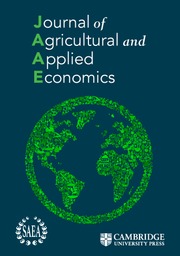Article contents
The Political Economy of Agricultural Trade Negotiations on the Uruguay Round of MTN: Can the U.S. and European Community Reach an Acceptable Compromise in the GATT?
Published online by Cambridge University Press: 28 April 2015
Abstract
A model of the political economy of agricultural policy formulation was used to analyze the current stalemate in the Uruguay Round of Multilateral Trade Negotiations. The combination of social welfare increasing and transferring policies in the European Community and the U.S. is one of the primary causes of the deadlock in trade negotiations. The Community's farm policy of high internal price supports, limited market access, and export subsidies represents short-term equilibria in the market for social-welfare policies which distribute benefits to producers at the expense of consumers and taxpayers. Thus, the opportunity for internal reform of the CAP leading to a compromise in the GATT negotiations is problematic at best. However, international commitments to agricultural policy reform will force the Community to make concessions which will bring equivalent change in domestic policy.
- Type
- Articles
- Information
- Copyright
- Copyright © Southern Agricultural Economics Association 1992
References
- 1
- Cited by


